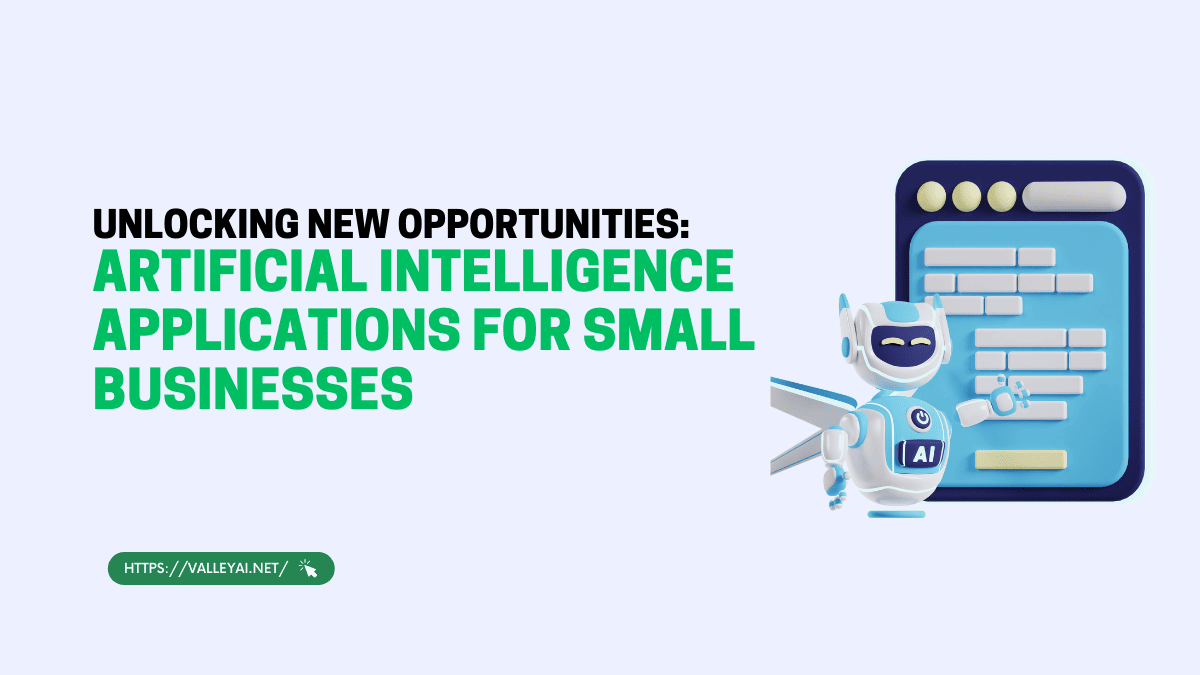Artificial Intelligence (AI) has many uses in businesses, like automation, data analysis, and customer engagement. It involves replicating human intelligence through powerful algorithms.
AI is a dynamic and growing technology. It can think and learn like humans. With the help of AI, you can analyze vast amounts of data and uncover hidden patterns.
AI experts are empowering businesses to make data-driven decisions. It drives businesses to success and growth. It is only one example of how AI improves business efficiency.
In this article, we will uncover many applications of AI for small businesses. So don’t let your competitors outsmart you in this AI era.
Practical Applications of AI for Small Businesses
Integration of AI into your business operations is not an option anymore. It is becoming necessary for businesses to survive in their niche. Here are some practical applications of AI for small businesses to take their productivity to another level:
AI in Customer Service and Support
With AI chatbots, you can automate your customer service and support. Integrate chatbots into your website to provide 24/7 support to your customers. You can train them to answer customer queries in real time.
You can automate everything from complaint generation to appointment bookings. Many customers feel happy that they don’t have to interact verbally. Chatbots collect customer data to provide personalized recommendations.
For example, you can use chatbots for your eCommerce business to suggest products based on customers’ browsing and purchase histories. Using bots allows you to free up many hours and automate repetitive questions. It will ultimately lead to improved customer satisfaction.
Refine Your Sales and Marketing Campaigns
Artificial intelligence uses AI-powered analytics to analyze real-time data to gain valuable insights. So it is easy for marketers to refine their marketing strategies, make informed decisions, and target the right audience.
It also revolutionizes lead generation because machine learning algorithms can analyze:
- Demographics
- Customer behavior
- Customer data
With this analysis, you can identify potential leads with a probability of conversion. So the sales team can focus on qualified leads and optimize their lead-generation processes. Moreover, you can streamline your lead nurturing workflow. It results in higher conversion rates and better sales outcomes.
Modern marketing is incomplete without personalization. With AI, you can analyze customer data to create highly relevant and tailored customer experiences. It enables businesses to enhance customer satisfaction and build long-lasting relationships.
New Developments in Operations and Logistics
The evolution of Artificial intelligence can benefit logistics companies in several aspects of their supply chains. This technology has introduced the most significant advancements, such as:
- Warehouse automation
- Autonomous vehicles
- Predictive analytics
- Smart roads
With this powerful technology, you can automate many procedures. It helps companies save both time and money. Many giant companies, like Google and Amazon, have invested in AI. By investing in AI, businesses can achieve the following:
- Resource management
- Redundancy forecast
- Route optimization
- Intelligent tracking
Keep in mind that supply chain procedures generate a huge amount of data daily. You can analyze this data with the help of AI. It will help you predict accurate demand forecasts and capacity. As a result, your business can be more proactive.
AI helps you in real-time decision-making, inventories, costs, warehouse locations, etc. It has the potential to augment logistics activities from start to finish. As a result, you can increase operational efficiencies, customer loyalty, and cost savings.
AI in Financial Management
After integrating AI into financial management, finance experts can get more time to focus on completing meaningful jobs. AI takes over some routine tasks, like:
- Bookkeeping
- Chasing receipts
- Inputting data
- Processing reconciliations
- Filling invoices
So professionals can engage in proactive financial analysis and modeling. AI algorithms can evaluate financial data for trading and market predictions.
AI enables banks to personalize financial management for customers. Moreover, financial institutions can automate credit eligibility checks using AI-based tools. It becomes easy to catch suspicious activity in a few seconds.
Streamline the Recruitment Process with AI
After the COVID-19 pandemic, there has been a drastic change in the working environment of human resource teams. Employees and HR can both work in remote and hybrid situations. At the same time, virtual recruiting has become a boon for human resources. It focuses on diversion and inclusion.
Read also: How did computers change the world
With the help of AI, you can easily analyze a candidate’s profile. HR managers can analyze the past work histories and interests of thousands of candidates with AI to match them with the best positions.
Workplaces can use bots to match candidates to jobs and perform an initial screening of candidates. Due to AI bots, candidates can schedule their interviews according to their schedule. AI is useful for analyzing formal and informal relationships in businesses.
Businesses can improve their productivity with the use of bots to schedule and record meetings, automate responses to emails, and analyze the performance of new employees. After integrating AI, human resource personnel have more time to focus on innovations.
Fraud Detection with Artificial Intelligence
Artificial intelligence plays an important role in fraud detection and management. Machine learning algorithms can analyze a lot of data to detect patterns and glitches. These patterns indicate fraudulent activity.
With an AI-powered fraud detection system, you can identify different types of fraud and prevent them, such as:
- Phishing attacks
- Identity theft
- Payment fraud
ML algorithms can adapt to and learn from new fraud trends and patterns. It will improve their ability to detect different frauds over time. You can integrate AI-based solutions with systems like biometric authentication and identity verification. This way, you can get a comprehensive fraud detection and prevention approach.
Real-life Example
Chatterbox: A Language Learning Startup
Chatterbox is a small startup powered by AI chatbots to learn languages. It revolutionized the education industry by combining advanced NLP (natural language processing) algorithms with collaborative conversational interfaces. For users, it creates a personalized and immersive learning experience.
Due to Chatterbox’s AI-powered chatbots, it is becoming accessible to learn and improve any language. It engages users in real-time conversations with chatbots. You can practice your language skills at your convenience. Chatbots can adapt to the proficiency level of each learner to provide tailored instructions and relevant grammar, vocabulary, and cultural insights.
With an AI-driven approach, Chatterbox has garnered immense customer satisfaction. Learners appreciate the engaging and interactive nature of this platform. It enhances their language learning experience. For all these reasons, Chatterbox has seen a surge in user adoption and an expansion of its user base.
The positive testimonials and word-of-mouth referrals have contributed to their growth. This customer satisfaction has translated into significant revenue growth for the company. With its innovative approach, Chatterbox has established itself as a leader in the language education industry.
How do we overcome challenges related to AI adoption?
AI adoption offers immense potential for small businesses, but you can’t ignore the challenges that come with it. If you want to understand the power of AI to drive growth and innovation, you should understand these challenges. See the details of the challenges along with the right strategies to overcome them:
Cost and Complexity
Small businesses often find it expensive and complex to implement AI. Here are some strategies to overcome this challenge:
- Start with a pilot project and implement AI in a specific area of your business where artificial intelligence can provide instant value. It enables you to test the waters and analyze the cost-effectiveness and feasibility of AI implementation.
- You can use cloud-based AI solutions. These solutions have lower upfront costs and offer scalability. As a result, you will only pay for the resources you use.
- Collaborate with AI startups, technology vendors, or consultants that specialize in serving small businesses. They may provide expertise and tailored solutions within your budget.
Selecting the Right AI Vendors and Solutions
Choose the right AI solutions and vendors to implement AI successfully. Here are some tips:
- Identify your business objectives and the specific problems you want AI to solve. With this clarity, it will be easy for you to choose the most suitable AI solutions.
- Evaluate the vendor’s expertise and experience in developing AI solutions for your business. Look for customer testimonials, proven track records, and case studies.
- Make sure that the AI solutions and vendors you choose can scale with the growth of your business. Moreover, consider their ability to integrate with current systems and adapt to future needs.
Change Management and Employee Training
To transition to AI-powered systems, you should invest in change management and employee training. Here are some main areas to focus on:
- Provide comprehensive training programs to educate employees about AI benefits, concepts, and usage. Offer upskilling opportunities to ensure they can work effectively with AI systems.
- Communicate the benefits of AI adoption to employees, address concerns, and focus on how AI can augment their work instead of replacing it. Foster a culture of adaptability and learning.
- Encourage collaboration between AI systems and employees. You can position AI as a tool to improve decision-making, productivity, and efficiency instead of threatening job security.
Conclusion
Overall, small businesses need AI technologies to enhance their efficiency and streamline processes. AI algorithms can give you valuable insights to make the best decisions for your business. With AI, you can unlock new opportunities, drive innovation, and achieve sustainable growth.
If you want to explore the maximum potential of your business, you can embrace AI. Gone are the days when artificial intelligence was limited to large corporations. It offers plenty of growth opportunities for small businesses, too. To effectively leverage AI, it is essential to consider your business’s specific goals and needs.
AI implementation may come with challenges like cost and data privacy concerns. Fortunately, you can overcome them with proper planning and adherence to regulatory guidelines. The AI world constantly evolves; therefore, you should stay informed about the latest AI trends and developments.
- SaaS Growth Strategies: A Complete Guide for Long-Term Success - May 18, 2025
- How Data Science Is Powering Business Decisions in 2025 - April 17, 2025
- The Future of Data-Driven Networking: Trends and Innovations - March 12, 2025

